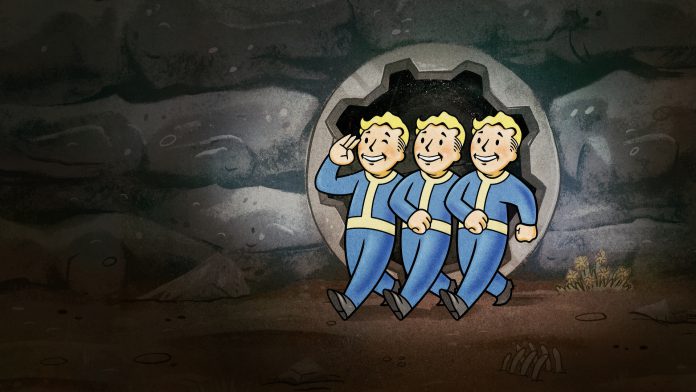It’s never been a better time to be a fan of the Fallout franchise. Twenty years ago, while under the umbrella of Interplay Productions, the franchise was given a deathblow with the release of the infamous Fallout: Brotherhood of Steel. Fallout would lay dormant until in October of 2008 Bethesda Softworks released Fallout 3 and the rest as they say is history. While it hasn’t all been sunshine and rainbows under Bethesda’s ownership Fallout has grown to be a landmark title in gaming culture with crossovers with Magic: The Gathering, Fortnite and Call of Duty as well as spawning a critically acclaimed and Emmy nominated Amazon television series reaching an even larger audience than just the general gaming population.
Watching the show I felt inspired to go back to retooling my old Fallout tabletop campaign and there’s surely a number of people with similar aspirations of running a game in the Fallout universe. Genre-wise, Fallout is post-apocalyptic but not played entirely straight like The Road Warrior. It’s also pulpy science fiction with a 1950s retro futuristic aesthetic like Forbidden Planet. This makes it somewhat challenging to find the right game to facilitate Fallout’s particular brand of genre blend but in my ongoing search to find the right game that works for me I’ve highlighted a few systems (focusing on games that have decent to great Virtual Tabletop support) identifying their strengths and weaknesses so that this can help you decide what works for your table.
Fallout: The Roleplaying Game
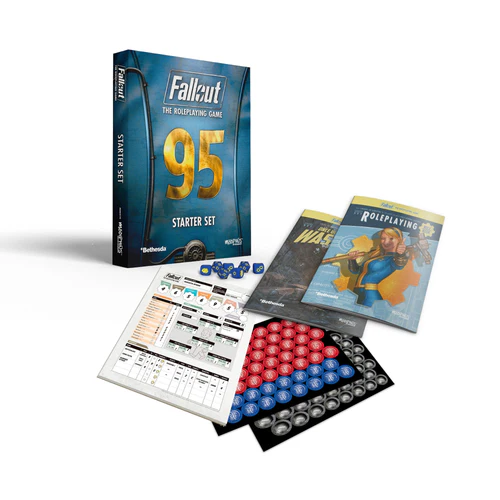
What better way to start than with Fallout The Roleplaying Game, the officially-licensed Fallout tabletop RPG. Like all other Modipheus RPGs, Fallout: The Roleplaying Game utilizes their very own in-house 2d20 system in which you roll two d20s and you aim to roll under the Target Number that’s comprised of the sum of your attribute and relevant skill to the check you’re making. There’s a good amount of content, with enemy stat blocks that cover most of the iconic Fallout enemy and creature types like ghouls, deathclaws, and super mutants. It includes plenty of equipment from across the franchise, so no need to figure out how to implement Power armor unless you’d like to add a variant. It also features both FoundryVTT support and Roll20 support for those who use virtual tabletops. There are options to play as Vault Dwellers, Brotherhood members, Super mutants, ghouls, and even robots with a trait respective to each of them. For gamemasters the core book provides major and minor settlements of the Commonwealth wasteland with a short write-up with example quests for the major areas. There’s a couple of tables for random encounters and weird wasteland encounters but they are again specific to the Commonwealth as well as being quite basic.
Fallout 2d20 does an admirable job emulating the gameplay mechanics of Fallout — Fallout 4, to be exact, which can be a major point of conflict. Though its two expansions Wastelanders Guide and Settler’s Guide both include new character creation options for characters not of the Commonwealth wasteland, mechanically Modipheus’ Fallout is entrenched in the gameplay mechanics of Fallout 4 down to the way armor works. Armor is broken down into pieces with each piece covering one of the 6 VATS hit locations (Both arms, legs, head, and torso) as per the video game. Magazines and books provide either a perk you can take at your next level up or a temporary bonus depending on what type of book or magazine it is like Fallout 4.
Scrounging, crafting, and some more scrounging is the general focus of Fallout: The Roleplaying Game. You will go out and explore the world and scavenge then return to your base and craft and continue that all the while managing hunger, thirst, disease, sleep and radiation again like Fallout 4. To that end there’s a comprehensive list of junk items all pulled from the video game itself. Crafting recipes for various items, weapons, chems, and food and drink items like all the Nuka Cola flavors. Fallout: The Roleplaying game is so thoroughly ingrained in the Fallout 4 gameplay loop that if you aren’t a fan of the survival crafting loop then I would suggest looking elsewhere.
Another point of conflict is how metacurrency heavy the game is with its Action Points which are, unlike say Fate Points in Dark Heresy, a party shared resource as well as feeling almost required to have even a chance at success for any roll that isn’t of trivial difficulty. If that’s not something that bothers you or your group and you like the idea of Fallout 4’s gameplay translated into tabletop form then Fallout The Roleplaying game is the game for you.
GURPS
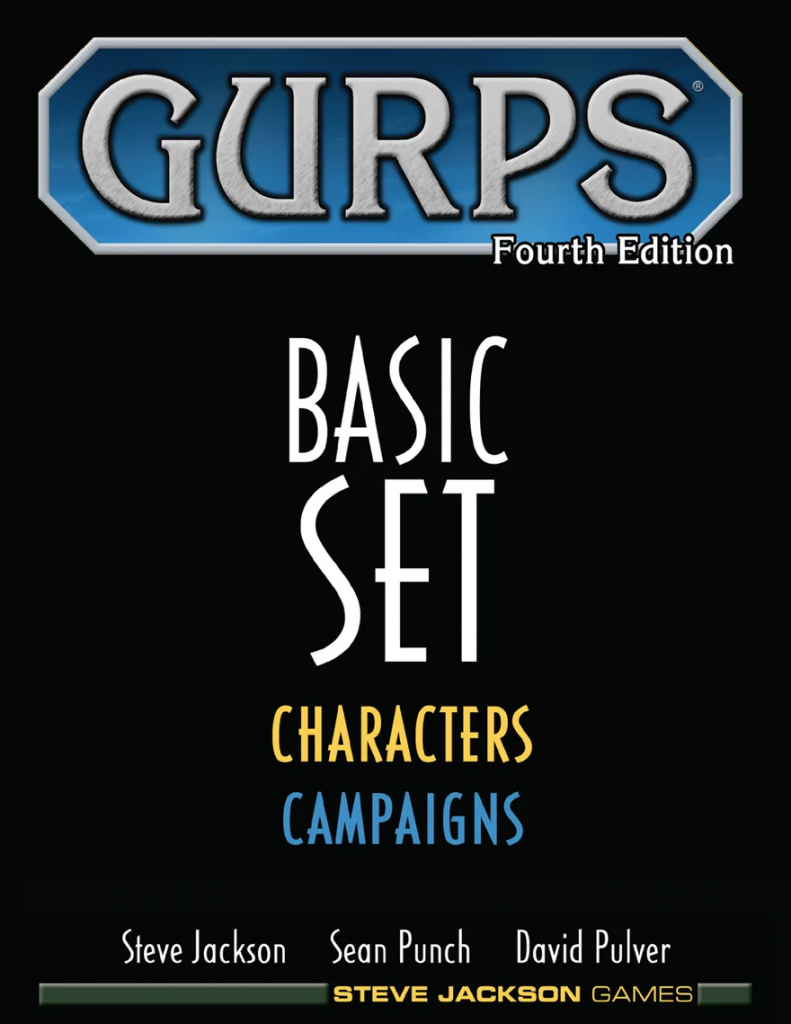
It would be hard to talk about systems to use for a Fallout campaign without mentioning the Generic Universal RolePlaying System or GURPS. Prior to the SPECIAL system we know and love, the first Fallout game was originally going to use GURPS with its title being Vault 13: A GURPS Post-Nuclear Adventure. That of course did not come to fruition as Interplay dropped the license entirely due to legal issues with Steve Jackson Games, but this little piece of trivia will continue to circulate for years and years to come. So why not use GURPS?
The strength of GURPS can also be seen as its main downside as an RPG and it’s right in the title: Generic. As its title would indicate GURPS goal is to be a universal system for any type of game you can theoretically conceive. It is a simulationist style game which makes for a rather complicated game mechanically.
You can play all sorts of games with GURPS: modern action, high fantasy, wuxia. Whatever you imagine you can surely bet GURPS has a splat book to help assist with that vision you have and there are a lot of splat books. GURPS is great for GMs who don’t mind flexing their game design muscle. To a certain extent GMing any game requires you to flex that muscle but GURPS asks more of you as the GM than just encounter design and rule adjudicating.
Fortunately GURPS: Fallout, an unofficial Fan created rulebook for GURPS 4e exists to ease that would-be burden. Much like with the Official Modiphius game there is a lot of already created content that is ready to use. Fallout specific racial templates, equipment, advantages and disadvantages, occupation templates, job tables, a bestiary, random encounter tables and scavenging tables, even rules for designing your own settlement to go along with already established settlements from Fallout and Fallout 2.
It is the other side of the coin compared to Fallout 2d20.
Fallout 2d20s roots are within the Bethesda line of Fallouts with more of a focus being on 4. GURPS: Fallout is rooted deeply within the first 2 games which is only natural for a fan book created in 2008. Fallout 3 would not even be a year old then, New Vegas wouldn’t be released for another 3 years and Fallout 4 and 76 wouldn’t even be a dream in anyone’s mind. As such you’ll notice a distinct lack of information on settlements and creatures unique to the Mojave, Commonwealth, and Appalachian wastelands.
Even with that GURPS: Fallout is a boon to me, as a Fallout fan whose heart is more firmly grasped by New Vegas and the Interplay games, so much so that it makes me reconsider my usual apprehension towards GURPS even if just a little.
Mutant Year Zero
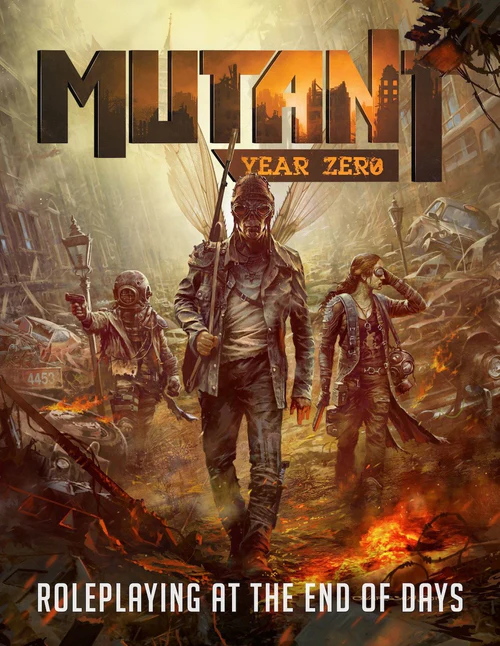
The last game that really caught my eye in my search was the Mutant Year Zero gameline developed by Swedish developer Free League Publishing which is the newest game in the Mutant franchise of Swedish tabletop roleplaying games that dates back to 1984 and is the origin of the Year Zero engine that Free League has used for its other games like Forgotten Lands, Blade Runner: The Roleplaying Game, and Alien: The Roleplaying game. What sets it apart from the other two games is that the Year Zero engine is a streamlined nearly rules-light and levelless system, reminiscent of Apocalypse World. Like Fallout 2d20 it focuses on scavenging, survival, and base building and the community in which you belong to. It’s more suited to portrayals of the wastelands of Fallouts 1, 3, parts of 4, and 76 rather than the more Post-post apocalypses of Fallouts 2 and New Vegas.
It does require some more effort in molding it to be Fallout than the other two games. Mutations are more ubiquitous and superhuman than those in the Fallout universe and mechanically they’re quite powerful so depending on how you view mutations in the setting you can take or leave them. The Elysium Expansion does focus on non-mutated Vault Dweller equivalent humans and also includes some Energy weapons and Powered Armor that you can use as a basis for the varieties of Power Armor Fallout has. Rot is effectively Radiation under another name and needs no changes to fit Fallout. Combat, unlike either GURPS or Fallout 2d20, is simpler and faster paced with no need for hit locations or battlemaps that lends itself far better to “Theater of The Mind” play than the other games and like other Free League games Mutant Year Zero has robust Foundry support that includes a macro for Zone generation.
If you like the early post-apocalypse portrayals of the wasteland like the Bethesda games, but want a system with more streamlined mechanics, and aren’t averse to a not insignificant amount of homebrewing; Mutant Year Zero offers a dynamic rules-light experience.
Honorable Mentions
I’d be remiss if I did not mention Ashes Without Number by Kevin Crawford. Crawford; known for his Without Number series of OSR (Old School Renaissance) games of which Stars Without Number (Sci-Fi Space Exploration), Worlds Without Number (more traditional Fantasy) and Cities Without Number (Cyberpunk) all belong to. Ashes will be a rework of Crawford’s previous post apocalypse game Other Dust and as of right now is currently being worked on with a very early Character Generation excerpt being posted here. Crawford’s previous work has been thoughtfully designed with simple OSR inspired rules with enough mechanical crunch and character customization that kept me, as someone with little interest in OSR titles, engaged. But what sets the Without Number series apart is the wealth of GM tools and advice for world building, NPC generation and encounter construction that are included and I expect for Ashes to continue that trend.
Another honorable mention goes to J.E. Sawyer’s Fallout Role-playing Game created by the New Vegas Director and published on his own wiki in the mid 2000s now archived through Archive.org and on the Independent Fallout Wiki. It was, as the man himself states
“not finished, not professional, and the author makes no claims that it is great or even good.”
Incomplete as it was, I still did find the read to be quite enjoyable. I’ve always respected J.E. Sawyer’s game design philosophy and seeing it in the form of a tabletop RPG was enough for me to at least briefly highlight.
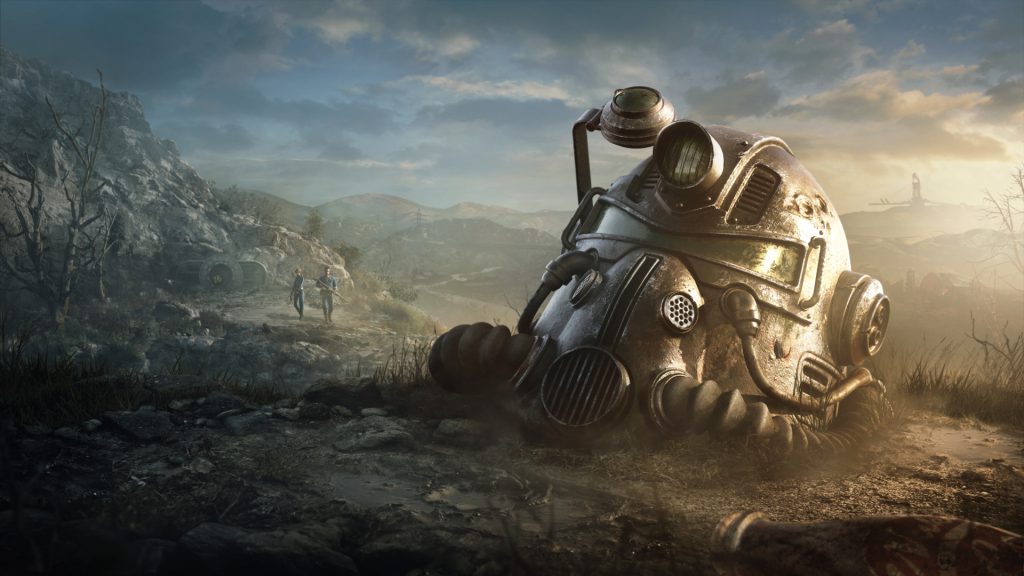
Fallout is to this day a series that I cannot seem to get enough of. It’s one of the foundational pieces of media that has shaped the way I look at all creative works; not just games. It’s a series that’s brought me great joy and I hope I was able to help anyone who might be interested in GMing a Fallout game.
Anyone who is running or has run a campaign of Fallout, feel free to sound off in the comments with what game you played, why you chose it, or even just anecdotes from your time with the game I’d love to hear from you.
Have any questions or feedback? Drop us a note in the comments below or email us at contact@goonhammer.com. Want articles like this linked in your inbox every Monday morning? Sign up for our newsletter. And don’t forget that you can support us on Patreon for backer rewards like early video content, Administratum access, an ad-free experience on our website and more.
